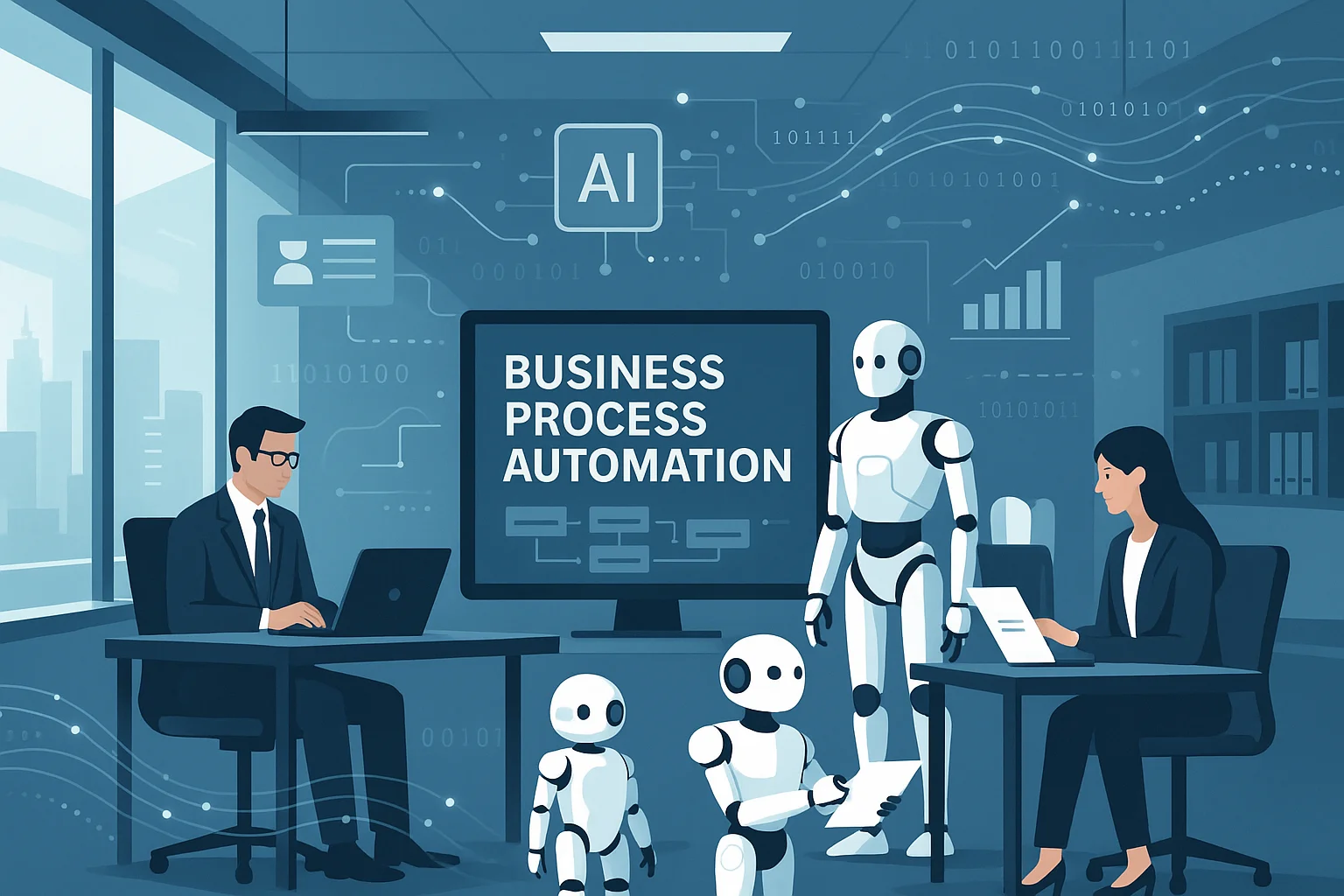Now Reading: 10 Best AI for Business Process Automation Software
-
01
10 Best AI for Business Process Automation Software
10 Best AI for Business Process Automation Software

Did you know that businesses waste an average of 30% of their time on repetitive tasks that could be automated? That’s nearly 3 hours in a typical workday! As someone who’s implemented automation solutions for various organizations, I can tell you that the best AI for business process automation software can reclaim that lost time. In this comprehensive guide, I’ll walk you through the top 10 solutions that are revolutionizing how businesses operate.
UiPath
UiPath stands at the forefront of AI-powered Robotic Process Automation (RPA). I’ve seen this platform transform operations across various industries, from finance to healthcare.
Key Features:
- AI-powered RPA bots that can mimic human actions
- Process mining and analytics to identify automation opportunities
- Both attended and unattended automation capabilities
- Enterprise-grade security and compliance features
- Document understanding using AI for processing unstructured data
Pricing:
- Community Edition: Free for individuals and small teams
- Pro Plan: Starts at $420/month per user
- Enterprise Plans: Custom pricing for large-scale automation needs
Pros:
- Best-in-class RPA capabilities with sophisticated AI integration
- Highly scalable for large organizations
- Strong security features make it suitable for regulated industries
- Comprehensive analytics help optimize automation processes
Cons:
- Requires significant technical expertise to implement effectively
- High pricing puts it out of reach for many small businesses
- Steep learning curve for new users
- Can be complex to maintain without dedicated resources
Best For:
UiPath is ideal for enterprise-level organizations with complex processes and the resources to support implementation. If you’re a large company looking to automate at scale with robust security, this is your go-to solution.
Automation Anywhere
When it comes to cloud-native RPA platforms, Automation Anywhere is one of my top recommendations. Their platform makes it easy to automate repetitive digital tasks without extensive coding knowledge.
Key Features:
- Cloud-native RPA platform with no on-premises setup required
- AI-powered automation capabilities
- Extensive bot marketplace for pre-built automation
- Both attended and unattended automation options
- IQ Bot for processing unstructured data
Pricing:
- Free Trial: Limited access to cloud RPA features
- Starter Plan: Pricing available upon request
- Advanced and Enterprise Plans: Custom pricing based on usage and needs
Pros:
- Cloud-native architecture eliminates the need for complex on-prem setup
- Powerful AI capabilities make it suitable for complex automations
- Scalable and easy to deploy remotely
- Extensive marketplace of pre-built bots speeds up implementation
Cons:
- Requires technical expertise for complex implementations
- Enterprise features come with a high price tag
- Learning curve for advanced bot creation
- Less customizable than some self-hosted alternatives
Best For:
Automation Anywhere is perfect for businesses looking for a cloud-based RPA solution with minimal IT infrastructure requirements. It’s particularly well-suited for organizations that need to deploy automation quickly across multiple locations.
Useful Articles:
Zapier
Zapier is my go-to recommendation for small businesses and teams looking to dip their toes into automation without a massive investment. It’s an AI-powered workflow automation tool that connects different apps to eliminate mundane tasks.
Key Features:
- Connect 3,000+ apps without coding
- Create “Zaps” to automate workflows between applications
- AI-powered suggestions to optimize workflows
- Natural language workflow creation
- Automated error detection and resolution
Pricing:
- Free: Limited to 5 Zaps and 100 tasks per month
- Starter: $19.99/month for 20 Zaps and 750 tasks
- Professional: $49/month for unlimited Zaps and 2,000 tasks
- Team and Company plans available for larger organizations
Pros:
- Incredibly user-friendly with no coding required
- Vast library of app integrations
- AI helps detect patterns and optimize workflows
- Allows workflow creation using plain English
- Proactively identifies and fixes automation issues
Cons:
- Limited for complex enterprise processes
- Can get expensive as task volume increases
- Some advanced features require technical knowledge
- Not ideal for data-intensive processes
Best For:
Zapier is perfect for small to medium businesses, marketers, and teams that need to connect various applications without coding. If you’re looking to automate simple workflows like data transfer between apps or notification systems, Zapier is your best bet.
Blue Prism
Blue Prism offers enterprise-grade RPA with a focus on security and governance. I’ve implemented this for clients in highly regulated industries where compliance is non-negotiable.
Key Features:
- Secure and scalable automation infrastructure
- AI-powered intelligent automation
- Centralized control and governance
- Strong integration with enterprise systems
- Digital workforce management
Pricing:
- No free version available
- Custom enterprise pricing based on the number of bots and complexity
- Typically starts at higher price points than competitors
Pros:
- Highly secure and compliant for regulated industries
- Excellent scalability for enterprise-level automation
- Strong governance and audit features
- Integrates seamlessly with large enterprise systems
- Robust security controls
Cons:
- Requires significant technical knowledge for setup
- Less intuitive interface compared to newer platforms
- Higher cost compared to other RPA tools
- Not suitable for small businesses or startups
Best For:
Blue Prism is the ideal choice for large enterprises in regulated industries like banking, healthcare, and insurance. If governance, security, and compliance are your top priorities, Blue Prism delivers where other platforms may fall short.
Useful Articles:
Microsoft Power Automate
Microsoft Power Automate (formerly Flow) has become one of my favorite recommendations for organizations already invested in the Microsoft ecosystem. It seamlessly integrates with Microsoft 365 applications while offering robust automation capabilities.
Key Features:
- AI Builder for intelligent document processing
- Desktop and cloud flows for comprehensive automation
- Process advisor to identify automation opportunities
- Pre-built templates for common workflows
- Native integration with Microsoft 365 apps
Pricing:
- Free plan with limited features
- Per user plan: $15/user/month
- Per flow plan: $100/flow/month for unlimited users
- RPA add-on: $150/bot/month
Pros:
- Seamless integration with Microsoft products
- User-friendly interface with low learning curve
- Combines RPA and workflow automation in one platform
- AI capabilities for document processing and form recognition
- Cost-effective for organizations already using Microsoft products
Cons:
- Limited functionality outside the Microsoft ecosystem
- Some advanced features require premium licenses
- Not as robust as dedicated RPA tools for complex processes
- Can be slow for data-intensive operations
Best For:
Microsoft Power Automate is ideal for organizations heavily invested in the Microsoft ecosystem. It’s particularly effective for automating document-based workflows and processes that involve Microsoft 365 applications.
Moveworks
Moveworks is an AI-powered automation platform that I’ve seen transform IT and HR support operations. It uses natural language understanding to autonomously handle employee requests.
Key Features:
- AI-powered conversational interface
- Autonomous ticket resolution
- Integration with collaboration tools like Slack and Teams
- Continuous learning from user interactions
- Multi-language support
Pricing:
- Custom pricing based on organization size
- Typically enterprise-level pricing
Pros:
- Dramatically reduces ticket resolution time
- Natural language processing understands employee requests
- Seamless integration with existing communication channels
- Self-improving system gets better over time
- Handles complex conversational flows
Cons:
- High implementation cost
- Requires initial training period to reach optimal performance
- Best suited for larger organizations
- Needs quality data to function effectively
Best For:
Moveworks excels in large enterprises with high volumes of internal support requests. If your IT or HR teams are overwhelmed with repetitive queries and ticket management, Moveworks can provide significant relief and improve employee satisfaction.
Useful Articles:
IBM Watson
IBM Watson brings enterprise-grade AI capabilities to business process automation. I’ve implemented Watson solutions for clients needing sophisticated data analysis and decision support.
Key Features:
- Advanced natural language processing
- Machine learning for process optimization
- Decision automation with explainable AI
- Enterprise-grade security and compliance
- Integration with existing business systems
Pricing:
- Various pricing models depending on specific Watson services
- Pay-as-you-go options available
- Enterprise plans with custom pricing
Pros:
- Powerful AI capabilities for complex processes
- Strong in regulated industries with compliance requirements
- Scalable for enterprise needs
- Explainable AI helps build trust in automated decisions
- Robust support and implementation services
Cons:
- Significant technical expertise required
- Higher cost compared to simpler automation tools
- Complex implementation process
- Can be overkill for straightforward automation needs
Best For:
IBM Watson is ideal for large enterprises with complex decision-making processes that benefit from advanced AI. It’s particularly valuable in industries like healthcare, finance, and legal where decision transparency and compliance are critical.
Make (formerly Integromat)
Make has become my secret weapon for creating sophisticated automations without the enterprise price tag. It offers a visual approach to building complex workflows.
Key Features:
- Visual workflow builder with intuitive interface
- 1,000+ app integrations
- Data mapping and transformation tools
- Error handling and conditional logic
- Webhooks and custom API integrations
Pricing:
- Free plan: 1,000 operations per month
- Core: $9/month for 10,000 operations
- Pro: $16/month for 15,000 operations
- Teams and Enterprise plans available
Pros:
- More powerful than Zapier for complex workflows
- Visual interface makes it accessible to non-developers
- Excellent value for the capabilities offered
- Flexible error handling and conditional logic
- Real-time execution and monitoring
Cons:
- Steeper learning curve than simpler tools
- Can get expensive with high operation volumes
- Some advanced features require technical knowledge
- Documentation could be more comprehensive
Best For:
Make is perfect for small to medium businesses that need sophisticated automation capabilities without enterprise pricing. It’s ideal for marketers, operations teams, and businesses with complex multi-step processes that span multiple applications.
N8n
N8n has quickly become one of my favorite recommendations for technically-inclined teams looking for an open-source automation solution. It offers incredible flexibility with self-hosting options.
Key Features:
- Open-source workflow automation
- Self-hosted or cloud options
- 200+ pre-built nodes for integration
- Visual workflow editor
- Webhook automation
Pricing:
- Self-hosted: Free and open-source
- Cloud: Starts at $20/month for 10,000 executions
- Enterprise: Custom pricing
Pros:
- Open-source flexibility and customization
- Self-hosting option for data privacy
- No vendor lock-in
- Active community and regular updates
- Powerful for technical users
Cons:
- Requires technical knowledge to set up and maintain
- Smaller ecosystem than commercial alternatives
- Self-hosting requires infrastructure management
- Less polished user experience than paid options
Best For:
N8n is ideal for technically-savvy teams that value flexibility and data privacy. It’s particularly well-suited for developers and organizations with specific compliance requirements that necessitate self-hosting.
Pega
Pega offers a comprehensive platform for business process automation that I’ve implemented for enterprise clients with complex needs. It combines RPA, workflow automation, and AI in a unified platform.
Key Features:
- End-to-end automation capabilities
- AI-powered decision hub
- Case management and workflow automation
- Low-code application development
- Predictive analytics and decisioning
Pricing:
- Custom enterprise pricing
- Typically higher investment than other platforms
Pros:
- Comprehensive platform for complex enterprise needs
- Strong in regulated industries
- Powerful case management capabilities
- AI-driven decision-making
- Scales well for large organizations
Cons:
- Significant investment required
- Complex implementation process
- Steep learning curve
- Requires specialized skills to maintain
Best For:
Pega is best suited for large enterprises with complex processes spanning multiple departments. It excels in industries like financial services, healthcare, and telecommunications where case management and regulatory compliance are critical.
Comparison Of The Top AI Business Process Automation Tools
When choosing the best AI for business process automation software, it’s important to compare key features, pricing, and use cases. I’ve put together this comparison table to help you make an informed decision:
| Tool | Best For | Key Features | Pricing | Ease of Use | AI Capabilities |
|---|---|---|---|---|---|
| UiPath | Enterprise RPA | RPA bots, process mining, document understanding | Starts at $420/month | Complex | Advanced |
| Automation Anywhere | Cloud RPA | Cloud-native, bot marketplace, IQ Bot | Custom pricing | Moderate | Advanced |
| Zapier | Simple workflows | 3,000+ app connections, Zaps | Free to $49/month | Very Easy | Basic |
| Blue Prism | Regulated industries | Security, governance, enterprise integration | Enterprise pricing | Complex | Advanced |
| Microsoft Power Automate | Microsoft users | AI Builder, Microsoft 365 integration | $15/user/month | Easy | Moderate |
| Moveworks | IT & HR support | Conversational AI, ticket resolution | Enterprise pricing | Moderate | Advanced |
| IBM Watson | Complex decisions | NLP, decision automation, compliance | Custom pricing | Complex | Very Advanced |
| Make | Complex workflows | Visual builder, 1,000+ integrations | Free to $16/month | Moderate | Basic |
| N8n | Technical teams | Open-source, self-hosted option | Free to $20/month | Complex | Basic |
| Pega | Enterprise processes | Case management, decision hub, low-code | Enterprise pricing | Complex | Advanced |
Finding the best AI for business process automation software depends on your specific needs, technical capabilities, and budget. Whether you’re a small business looking for simple workflow automation or an enterprise requiring sophisticated AI-driven processes, there’s a solution out there for you. I’ve found that the key is to start with a clear understanding of your processes and goals, then match them to the right tool. By leveraging these powerful AI automation platforms, you can reduce errors, save time, and free your team to focus on what really matters: growing your business.





















